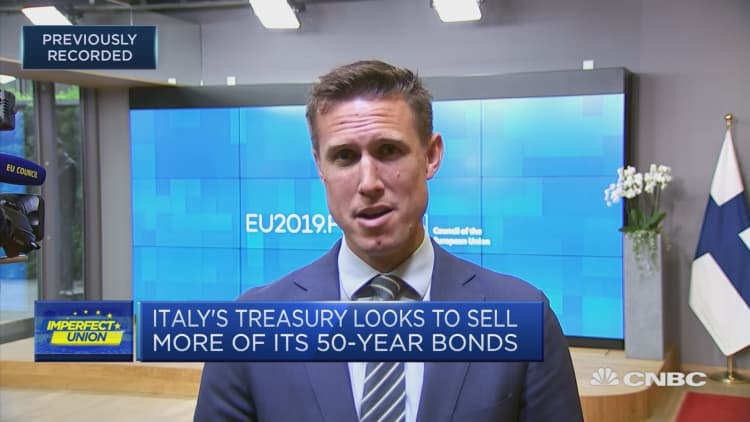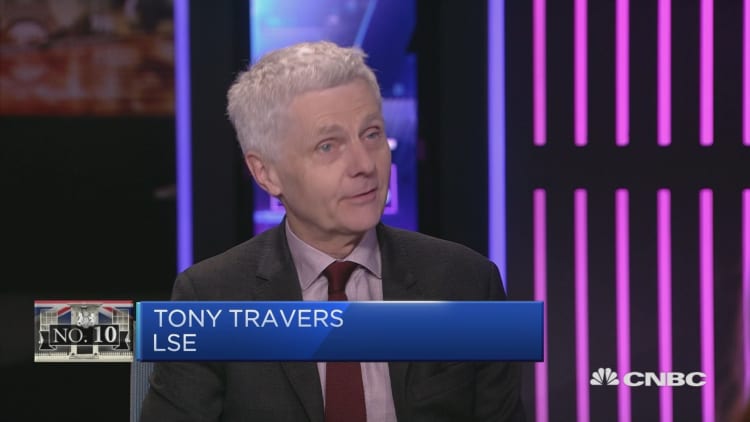
The Irish finance minister has warned that his government is stepping up preparations given the "significant risk" of a disorderly Brexit.
The two candidates for the role of the U.K.'s next prime minister have continued to criticize each other's plans for Britain to leave the European Union (EU) but neither have completely ruled out leaving with no deal in place at all. The uncertainty has sent pound sterling to near two-year lows versus the U.S. dollar.
"From the point of view of the Irish government we now believe that the prospect of a disorderly Brexit is now a significant risk and the Irish government is meeting to day to review our readiness for this great challenge," Paschal Donohoe told CNBC at a meeting of European finance chiefs in Brussels on Tuesday.
Donohoe also claimed that it was important that new leadership at the European Commission — the EU's executive branch — be appointed quickly.
This was necessary, he said, "to allow Europe to respond back to protect our single market and to ensure that we can rise to the risks that might be created in dealing with Brexit."
The Irish government issued a new Brexit planning document this week and at a press conference to mark its publication, the country's deputy prime minister Simon Coveney described a disorderly British departure from the EU as an "ugly prospect."

In the 117-page document, officials in Dublin cautioned that if the U.K. were to leave the EU, without first agreeing to the terms in Theresa May's negotiated Withdrawal Agreement, there would be "severe macroeconomic, trade and sectoral challenges both in the immediate term and in the longer term" for Ireland, because of its reliance on the bilateral trading relationship with the U.K.
In the event that no final deal between London and Brussels can be ratified, EU treaty obligations will oblige the Irish government to protect the integrity of the European single market by instituting some form of checks on goods that pass between the Republic of Ireland and Northern Ireland — a separate nation that forms part of the United Kingdom.
This has long proven politically contentious for the government of Ireland's prime minister, Leo Varadkar, who has hoped that internal and external pressure on the British government would prevent that particular course of action.
"They've relied on the fact that they're supported by the EU in their desire not to have a hard border," said Katy Hayward, a senior fellow at think-tank The UK in a Changing Europe. "Acknowledging they will have checks and controls, this is the first time they're spelling it out in a bit more detail than they have before," she added.
Coveney acknowledged in his public remarks Tuesday that the need for checks on goods would have to be balanced against a separate requirement that there be no physical infrastructure on Ireland's international border with Northern Ireland.
That stipulation forms part of a decades-old peace deal, known as the Good Friday Agreement, which put an end to generations of sectarian and nationalist violence in the troubled region. The U.K.is the counter-party signatory to that agreement.
Outgoing British Prime Minister Theresa May and her negotiating team struggled for two years with this conundrum, and yet both her potential successors in Downing Street have failed to explain clearly how they would resolve the problem, to the satisfaction of Dublin, Brussels and a voting majority of the Westminster parliament.
Political analysts say that Irish officials are unlikely to simply sit on their hands while the Conservative leadership contest continues.
"They're realising there's a lot of loose talk around No Deal, sort of a blasé attitude from the two candidates for Prime Minister," says The UK in a Changing Europe's Hayward. "There's no harm reminding people of the realities of no deal."

